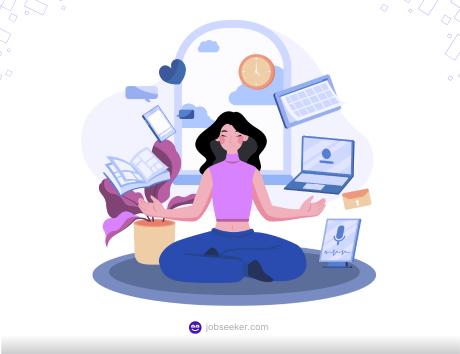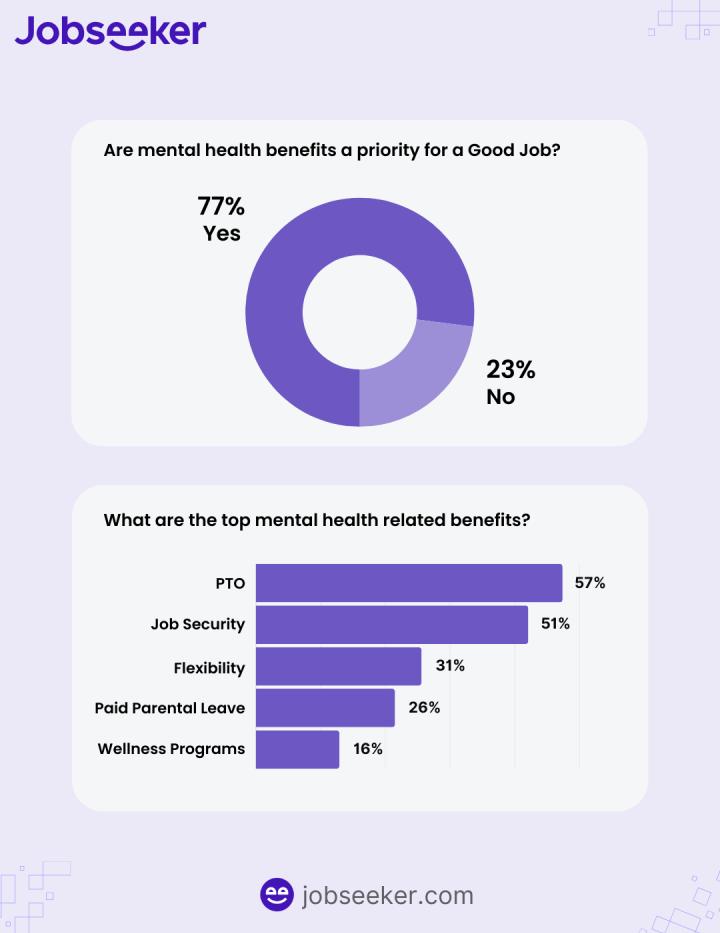77% of Professionals Say Mental Health Benefits Define a 'Good Job'
Jobseeker’s latest survey highlights the increasing significance of mental health support in shaping employee satisfaction and retention. The findings emphasize how mental health benefits—such as paid time off, wellness programs, and flexibility—are now critical factors in defining a desirable workplace across various industries and demographics.

In honor of World Mental Health Day, Jobseeker, the #1 toolbox for job seekers and employers, reveals key findings from its recent "Good Jobs of the Future" survey that underscore the critical role of mental health support in the modern workplace. The survey, based on responses from professionals across various industries, highlights how mental health benefits contribute to shaping what employees of today will consider a "good job" in the years to come.
Key Findings
A staggering 77% of professionals now view mental health benefits—such as PTO, wellness programs, and parental leave—as essential to their job satisfaction. Among full-time employees, this number rises even higher to 79%, with freelancers close behind at 78%. Notably, 81% of women and 73% of men believe that these benefits significantly shape their perception of a desirable workplace.
Mental Health Benefits: A Must-Have for All “Good Jobs”
Mental health benefits have shifted from being a perk to a necessity in today’s job market. Employees now expect their workplace to prioritize well-being and balance, making mental health support a critical factor in defining an ideal job environment. In 2024, a "good job" is defined by its capacity to support employee mental health, which can reduce workplace burnout and stress while improving overall productivity.
Interestingly, while our survey showed that only 33% of business owners prioritized their mental health benefits for themselves and their employees, this low number contrasts sharply with the high risks they face. Entrepreneurs and business owners are particularly vulnerable to mental health challenges, with nearly half (42%) of small business owners reporting burnout in the past month alone, according to a recent Forbes report. The findings suggest a critical need for more mental health awareness and tailored support for business owners.
The 2024 Jobseeker survey highlights several key aspects of job satisfaction related to mental health:
- Job Security: Prioritized by 55% of full-time employees.
- Positive Work Environment: Valued by 50% of women and 41% of men.
- Work-Life Balance: Particularly important for workers aged 45-54, with 37% citing it as a key factor.
- Flexibility: Highly valued in marketing (50%) and service industries(48%), though less so in healthcare (21%) and engineering (6%).
Providing PTO, wellness programs, and parental leave is not just about ticking boxes but about creating a supportive environment that nurtures both personal and professional growth. These benefits directly impact employee retention, satisfaction, and overall workplace culture.

In light of World Mental Health Day, Jobseeker recommends that employers:
- Reassess their benefits packages to include comprehensive mental health support.
- Foster a company culture that prioritizes work-life balance.
- Implement flexible work arrangements whenever possible.
- Offer wellness programs tailored to employee needs.
- Recognize the diverse mental health needs across different demographics.
About Jobseeker:
Founded in 2021, Jobseeker’s mission is to provide job seekers with the #1 toolbox for career success. From creating CVs, resumes and cover letters to tracking job applications, Jobseeker offers innovative solutions that empower candidates. With a focus on user experience and well-being, Jobseeker continues to serve millions of users across 26 languages, helping them find fulfilling jobs in nearly every corner of the globe.
Impress potential employers with your resume
Follow step-by-step professional guidance to create a polished resume in minutes.


